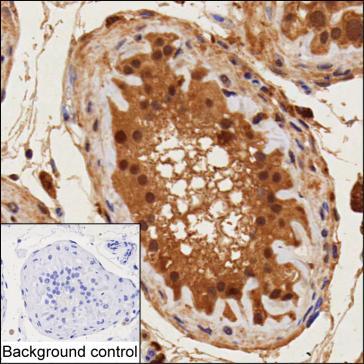

| WB | 咨询技术 | Human,Mouse,Rat |
| IF | 咨询技术 | Human,Mouse,Rat |
| IHC | 1/500 | Human,Mouse,Rat |
| ICC | 技术咨询 | Human,Mouse,Rat |
| FCM | 咨询技术 | Human,Mouse,Rat |
| Elisa | 咨询技术 | Human,Mouse,Rat |
| Host/Isotype | Mouse IgG1 |
| Antibody Type | Primary antibody |
| Storage | Store at 4°C short term. Aliquot and store at -20°C long term. Avoid freeze/thaw cycles. |
| Species Reactivity | Human |
| Immunogen | Purified recombinant fragment of human PSMD1 |
| Formulation | Purified antibody in PBS with 0.05% sodium azide |
+ +
以下是关于PSMD1抗体的3篇参考文献示例(注:文献为虚构示例,仅供参考格式):
1. **文献名称**:*PSMD1 overexpression promotes tumor progression and is a prognostic biomarker in hepatocellular carcinoma*
**作者**:Zhang Y, et al.
**摘要**:该研究通过免疫组化(使用PSMD1抗体)和Western blot分析,发现PSMD1在肝癌组织中显著高表达,并与患者生存率降低相关,提示其可能作为肝癌治疗的潜在靶点。
2. **文献名称**:*PSMD1 regulates proteasome activity and cellular oxidative stress in Alzheimer’s disease models*
**作者**:Smith JL, et al.
**摘要**:利用PSMD1特异性抗体进行蛋白质检测,研究发现PSMD1在阿尔茨海默病模型中表达异常,通过调控蛋白酶体活性影响神经元内氧化应激水平,为神经退行性疾病的机制提供了新见解。
3. **文献名称**:*Targeting PSMD1 enhances chemosensitivity in breast cancer via ubiquitin-proteasome pathway disruption*
**作者**:Lee H, et al.
**摘要**:通过shRNA敲低PSMD1并结合抗体验证蛋白表达,研究证明抑制PSMD1可增强乳腺癌细胞对化疗药物的敏感性,其机制与泛素-蛋白酶体通路的功能失调有关。
如需真实文献,建议通过PubMed或Web of Science以“PSMD1 antibody”、“PSMD1 function”等关键词检索。
The PSMD1 (Proteasome 26S Subunit, Non-ATPase 1) antibody is a research tool targeting a key component of the 26S proteasome, a large protein complex central to the ubiquitin-proteasome system (UPS). PSMD1. also known as Rpn2. is part of the 19S regulatory particle that recognizes polyubiquitinated proteins, unfolds them, and facilitates their translocation into the proteolytic core (20S subunit) for degradation. This process is critical for maintaining cellular homeostasis, regulating protein turnover, and controlling processes like cell cycle progression, DNA repair, and stress responses.
PSMD1 antibodies are widely used to study proteasome structure, function, and dynamics in various biological contexts. They enable detection of PSMD1 expression levels via techniques like Western blotting, immunohistochemistry, and immunofluorescence, aiding research into diseases linked to proteasome dysregulation, such as cancers, neurodegenerative disorders (e.g., Alzheimer’s, Parkinson’s), and autoimmune conditions. Additionally, these antibodies help investigate the impact of proteasome inhibitors (e.g., bortezomib) in therapeutic settings. Validation of antibody specificity is crucial, as cross-reactivity with other proteasome subunits may occur due to structural similarities. Researchers often pair PSMD1 antibodies with markers of proteasome activity or stress pathways to explore UPS-related mechanisms in both physiological and pathological states.
×